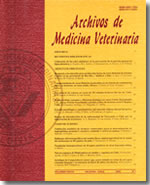Additional evidence of the facultative intracellular nature of the fish bacterial pathogen Piscirickettsia salmonis
Main Article Content
Abstract
Piscirickettsia salmonis is a highly virulent and contagious microorganism that affects net pen-reared salmonid fish worldwide since the last third of the past century, with little knowledge about its intracellular survival mechanisms. Following a number of recent and non-conclusive reports which questioned its obligate intracellular condition, we decided to show additional evidence to challenge this well-established paradigm carrying on both basic biology as well as classical molecular experiments that confirm its facultative intracellular nature. In this report, we unequivocally demonstrate that the bacteria recovered from tissue culture amplification, in vitro grown agar plates or grown in liquid cultures, were the same organism and all of these isolates equally fulfils Kochs postulates. In addition, genomic and proteomic analyses confirmed that bacteria from different growth source conditions belonged to the same LF89 prototype strain as originally described by Fryer in 1992. Notwithstanding, growth of the bacteria both in cell-free media as well as in tissue culture cell lines were definitively suboptimal, and much more analysis are required to fully understand the biology of the pathogen. Interestingly, we were able to grow the bacteria in liquid media but at very slow rate. We conclude that, in addition to previous reports, our results confirmed the facultative intracellular nature of this fish pathogen.

